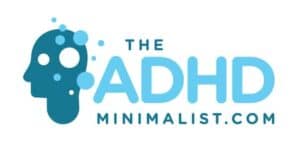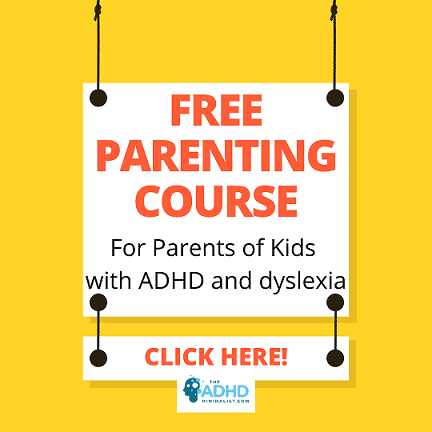
My family struggles with ADHD (inattentive and hyper) which makes life more complicated. We found that having fewer items in our field of vision helps us to concentrate better. In other words, an exhaustive declutter reduced our ADHD symptoms! This is what we learned along the way!
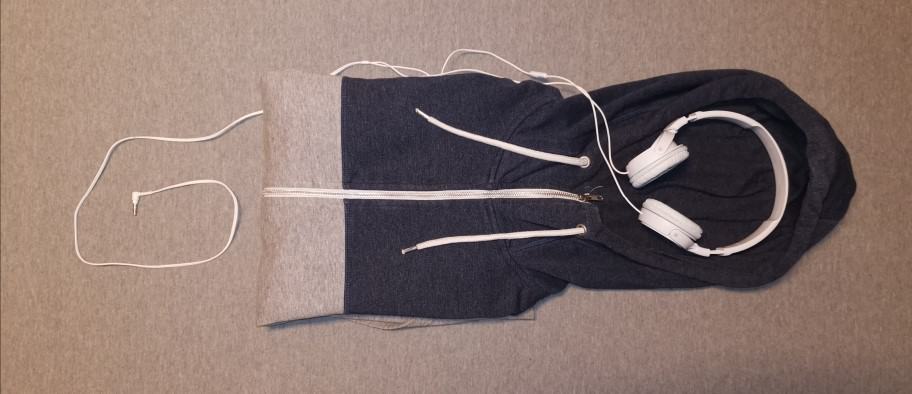
1. You know yourself and your ADHD symptoms better than anyone else in the world! Start decluttering in a way that gives you the highest chance of finishing!
As they say in Sweden, ‘You can’t pull everyone through the same comb.’ In other words, Everyone is different. Just because you have ADHD like thousands of others doesn’t mean that your ADHD is the same as theirs.
ADHD is like a pie cut into many pieces. Each piece represents a part of your life, School, family life, work, recreation, hobbies, household chores, ways we relax, social life, social media presence, Gamer, and the deep inner part of you that asks hard questions to name a few. We all have different pieces of pie, and ADHD is like a spice. Each piece doesn’t get the same amount of spices.
Annie Eklöv
It’s kind of like my friend’s experimental pie which she received from her son who added chili powder to the cherry pie filling!
One piece had as much chili power as the rest of the pieces put together. That’s how it can be with ADHD some of us have lots of ADHD problems in the slice of life called school. Others have a terrible time in social situations. Still, others struggle to keep their house/room clean or talk too much in social situations.
Most of us don’t have enormous ADHD problems in all of our pieces of pie. Every once in a while I’ll meet someone who does have lots of ADHD spice in most of his slices of pie, and unfortunately, these are the people who struggle most with ADHD. We who get the chili dumped mostly in one slice of pie are the lucky ones.

Decluttering for those with ADHD is a balance of pushing yourself to get it done and respecting how you feel about decluttering.
- If the best way for you to go about it is to roll up your sleeves and try to tackle your whole home/room in a long weekend then do that!
- If you need to go slow because doing everything all once completely overwhelms you then slow down and scroll to the next section.
How to declutter all in one go when you have ADHD!
- Decluttering in one weekend when you have ADHD
- Set a starting date
- Set a finish date
- The days after the trash truck comes and empties your trash can are good decluttering days! You are going find lots of trash while decluttering and starting with an empty trash can makes things easier.
- Before you start!
- Buy several rolls of big black trashbags
- Pick up some used cardboard boxes from a local grocery store
- Clean out the trunk of your car
- Find a place to keep hand-me-down and other items you need for younger siblings.
- Find a place to keep sentimental items.
- buy yourself a box for sentimental items and challenge yourself to only keep what fits in the box.
- Make sure all the trash cans in the house are emptied
- Choose your method
- Marie Kondo sparks joy
- The Bin Method. You label bins with trash, recycling, hand-me-downs, maybe, donate, keep, and you sort everything in that room accordingly.
- Joshua Becker’s room-by-room method
- It really doesn’t matter how you chose to declutter it matters that you actually roll up your sleeves and get rid of stuff that’s hindering you from really living life!
- Getting Started!
- On your appointed day get up early and eat a good breakfast full of protein (I usually get so into decluttering that I forget to eat lunch till 14:00 or 15:00 in the afternoon!). You’ll get more done if you’re full, but not stuffed.
- Start with items that you think will be easy (leave sentimental items for last.
- Decide where to start (what room or what category of items)
- Try to get through your entire home in the designated time.
- Save sentimental items for last and put them all in one place if you stumble over them while decluttering something else. If you run out of time save this pile of sentimental items for a different weekend.
- When you’re done.
- Go through your maybe box and try to donate as much as possible.
- Take all the items destined for the second-hand store out to your car.
- Drive the items and donate them the next day. This is extremely important!!!
- If your trash can is full drive the trash to a disposal center if this is available where you live. Otherwise, make sure it gets to the curb alongside your full trash can on trash day.
- Load the recycling in your car.
- Drive the recycling to the recycling center the day after you’re done decluttering.
- Put the things you keep back in their places. Make sure to make a home for everything you keep.
- When making a home for your things remember the cardinal rule of organizing – store everything of the same kind together.
- Celebrate!
- Before you start!
- The days after the trash truck comes and empties your trash can are good decluttering days! You are going find lots of trash while decluttering and starting with an empty trash can makes things easier.
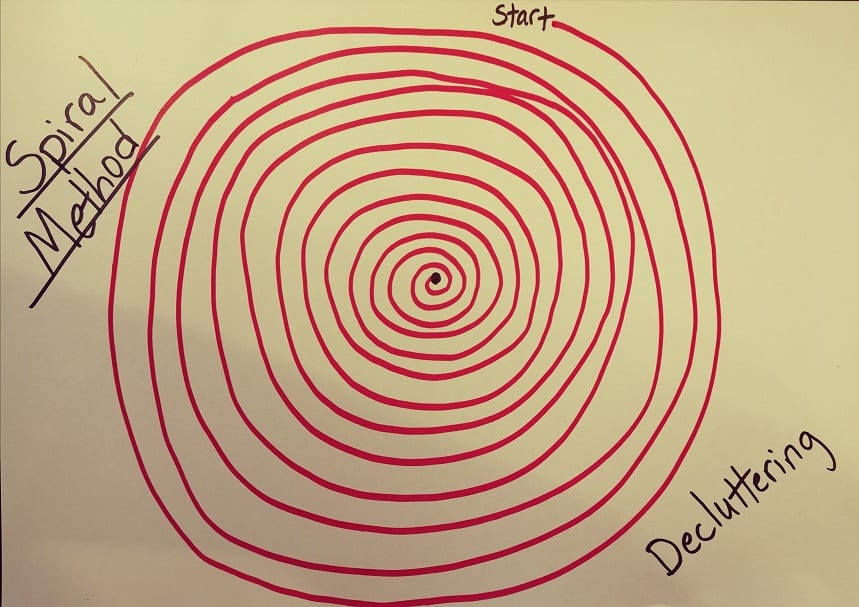
How to declutter Slowly to avoid overwhelm when you have ADHD.
I began my decluttering journey with slow declutters. They are still one of my favorite ways to quickly refresh a room and get the excess out!
Basically, I labeled several trash bags and dragged them around the house sorting trash, donation items, recycling, and misplaced items (I relocated these to other places in the house after decluttering) among other things. I did this every day for 15 minutes. You can read more about this process by clicking on the link below or feel free to watch (or listen to) my YouTube video explaining this process.
My spiral method of decluttering check out the link How to Start Living Minimally With an ADHD Family
2. ADHD and Decluttering How to know if Items are essential.
It’s not always easy to know if you should keep an item. There are all kinds of measuring sticks for deciding whether to keep something or not, for example.
- Does it spark joy?
- Is it useful?
- How did I accumulate it?
- Is it sentimental?
- Do I like it?
- Will I miss it?
- Is it hindering me from living the life I want?
This list could go on and on. I suggest you go with your gut or your initial reaction to items. Often I know already that I don’t need things, but my brain talks me into keeping stuff just in case!
When you look at an item and you immediately feel YES then keep it. If you don’t feel that yes then discard it. I know this is oversimplified, but strive to keep your decluttering that simple, and if you need a box for maybe items that’s ok too!
What you don’t want to do when you’re already overwhelmed is start pulling items out of closets and drawers when you know you won’t have enough time to sort it and put stuff back.
Only get out stuff if you can sort through everything and put all the items where they go (recycling and donation items go in the car. Trash goes in the trash bin and everything you’re keeping gets put away.) in the time you allotted for decluttering.
You can read more about how to know if items are essential in the post link below.
ADHD and Decluttering! How to know if items are Essential.
My video about why we keep things may be a good one to watch before you start decluttering!
3. How to speed up your decluttering project when you have ADHD!
If you want to declutter faster when you have ADHD don’t touch your things!
My best tip for decluttering quicker is not to touch your things. Invite a friend over to hold up items and ask what you want to keep.
Only touch things you immediately know you love or that are so useful you can’t live without them.
Often I notice this strange phenomenon as I help others declutter. When I hold an item and ask if they want to keep it they are more likely to donate it. If they hold an item and ask themselves, ”Do I want to keep this?” they are more likely to keep it.
I think this phenomenon has a lot to do with the endowment effect and how it affects us. Items you haven’t seen for a long time aren’t active in your life. Often you forget they exist. Touching them reactivates your sense of ownership and it’s suddenly harder to part with them than it was before you touched them.
The endowment effect is basically the finding that people are more likely to retain an object they own than acquire that same object when they do not own it.
To learn more about the endowment effect and how it affects you pick up a copy of my book as soon as it comes out. I go into more detail on this subject in one chapter! Author Portfolio Page
Let inspiration guide your decluttering when you have ADHD.
Start by decluttering the room or group of items that you feel inspired to declutter. Inspiration usually is accompanied by extra energy. Use that energy burst to get your first project done.
Having the inspiration to do something usually means it takes less time to accomplish it. When you try to trudge through what is dull and boring it takes more time. Once you finish a project you’ll get another energy burst from your accomplishment! Use that energy burst to boomerang yourself into another decluttering project!
I know sometimes you may feel no inspiration whatsoever, but if that’s the boat you’re in, pick a small manageable decluttering project that you can finish in a couple of hours. Trudge through it and use the energy burst you get from finishing to propel you into your next project!
Use Hyperfocus to declutter faster!
Inspiration goes hand-in-hand with hyperfocus for those who have ADHD. Use your hyperfocus. Put blinders on to other projects like if you did your lunch dishes and focus, focus, focus till you’re done decluttering!
Be Prepared before you start decluttering for a quick declutter!
Buy trash bags, get empty boxes, and order a container if you need to, but have everything you need in place before you start decluttering or you’ll spend the first hours of your decluttering project looking for things and getting discouraged when you can’t find what you need. That can stir up enough negative feelings to derail your whole project!
To declutter effectively when you have ADHD you must ask for help from friends, family, or a professional.
Know your weaknesses and ask for help! If you have a hard time getting things out of the house after you declutter ask a friend to pick up your discard pile and trash bin and get rid of it for you!
Maybe you can’t decide what to keep and what to discard. Ask a friend to come over and help you decide or to hold up items so you don’t need to touch them.
Maybe the project seems overwhelming and just having a friend to help you makes it seem more manageable.
Think about what you need to get the job done and write it down. Write down who you need to call to make sure you get it done. Don’t put off making the call! Call and ask for help on the same day!
To declutter fast when you have ADHD you must set a start date and a finish date for your decluttering project!
Some of us with ADHD are chronic procrastinators. If that’s you set a date to start is crucial! If you don’t start you’ll never finish!
4. Change your mindset and say goodbye to just-in-case items!
This one mind-shift helped me finally let go of the just-in-case items I was holding on to! I decluttered my home several times and I reduced my just-in-case hoard every time, but it was still a way too big and I couldn’t let go!
It was a new idea that helped me let go. In order to keep this post from getting extremely long I will link to the article I already posted on realizing it’s ok to let go of just-in-case items. Just click below.
One Decluttering Mindset Shift = Bye-bye Just-in-case Items! (I Finally Finish Decluttering!)
5. The Benefits of decluttering and living minimally when you have ADHD!
Minimalism has a lot of benefits for those who have ADHD. My son (ADHD hyper) found that he felt calmer and could concentrate better when he had only the things he loved and needed in his bedroom.
He threw out more than half his stuff several years ago. It was hard for me to let him discard and donate so many things!
When I saw how much better he was doing after decluttering his room I got inspired to declutter the rest of the house.
He often complained when the living room was messy or if his sisters had a toy pile in the hall. His complaining didn’t motivate me, but seeing his transformation did!
I sat on the couch one evening and my gaze momentarily left the tv and rested on the clutter surrounding me. At that moment a thought struck me, ”If decluttering his bedroom made him feel and act much better then what kind of effect could decluttering our whole house have on his ADHD?”
That thought was enough to jump-start me into decluttering!
There are many more benefits to decluttering when you have ADHD. You can read my entire list here How Minimalism can Reduce ADHD Symptoms. Don’t forget to check out the rest of my posts on the benefits of minimalism!
18 Reasons Why Minimalist Living Can Benefit Your Family
19 Simple Ways that Minimalism Reduces Anxiety
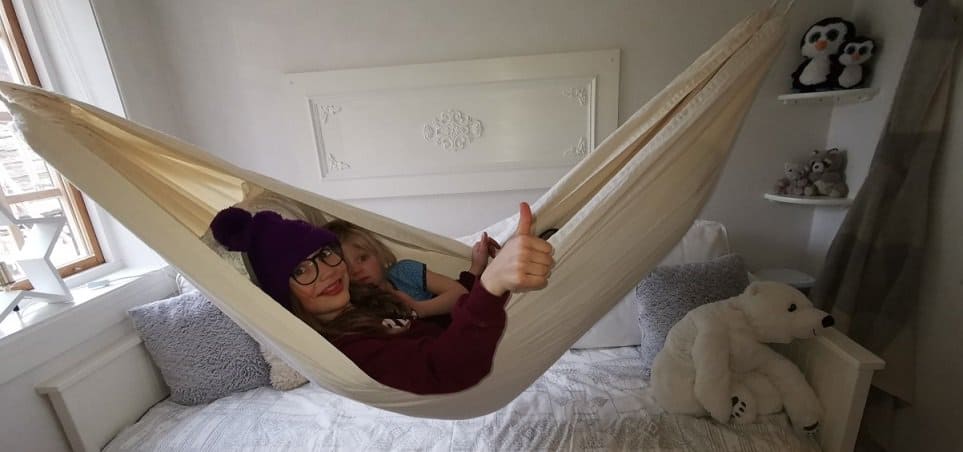
6. When you have ADHD using a decluttering check list can speed up the process!
Check out my lists of items you can declutter and never miss!
30 Things That Accumulate In Bathrooms That You Don’t Actually Need!
33 Things In Your Home Office You Can Get Rid of Today With No Regrets!
17 Toys Your Kids Will Never Notice You Threw Out!
34 Items In Your Closet That You Can Toss and Never Miss
32 Kitchen Items You Can Toss Today and NEVER Miss!
16 Ways to Start Goal-Oriented Decluttering!
Put on your headphones and listen to the lists of items you can declutter and never miss if you don’t have time to sit down and read.
You can just listen you don’t need to watch these videos if you don’t have time. Listen or watch while you do dishes or fold watch. It’s just me sitting in my living room reading the lists!
Check out my blog post on how fatty acids reduce ADHD symptoms!
Copyright Annie Eklöv
